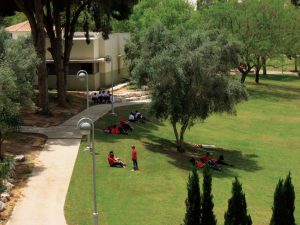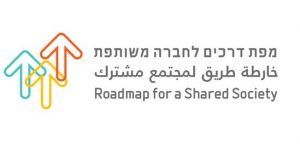
How do we find the formula for the best lives together? How do we share the resources and opportunities in a given society when some feel they have more rights than others?
Israel is experiencing increased tension and division between Jews and Arabs. Viewed from the outside this increased tension is part of a general European development, where expressing racist attitudes has acquired increasing legitimacy. But explaining problems in Israel as being part of a common development is perceived as not recognizing the uniqueness of the Israeli conflict, and to offer a comparative analysis referring to parallels in other countries is seen as a lack of understanding.
Givat Haviva is a center in Israel working for coexistence and a shared society, and they are responding to this increased tension by developing a roadmap for a shared society. The annual conference held on March 20 was a mobilization of politicians, NGO workers, journalists and the general public. The purpose of the conference was to discuss recommendations on land use, governance, economic development, education, and cultural representation and restorative processes developed by five expert groups .
Each expert group includes a prominent Arab and Jewish member, which will promote the recommendations to the general public. 70 experts have been involved in the process. A wide engagement will follow the next 6 months, with public meetings around Israel. The feedback received in these meetings will be integrated into the proposal, and the final Roadmap for a Shared Society will be presented to Knesset in December 2017. This presentation will launch a wide advocacy campaign for its adoption.
A Shared Society

Givat Haviva sprang out of the Kibbutz movement by receiving a small piece of land from the Kibbutz Federation.Today the kibbutz movement is seemingly dead, but Givat Haviva is a village teeming with inspiring peace work. The leader of the Center for Shared Societies, Mohammad Darawshe, took time off and went to Berlin last year. Supported by the Robert Bush stiftung, he studied how other European countries dealt with minorities, and last October he organized a conference in Berlin where the Roadmap to a Shared Society was presented.
During the course of his studies he discovered Nansen Dialogue. Our work in the Western Balkans had obvious similarities to the work they face in Israel. Yugoslavia was a failed attempt at creating a shared society. There were several reasons for this, but two of them are very relevant in this context; Yugoslavia neglected to deal with the past. There was no politics of reconciliation after WWII. No restorative justice. The second mistake was the failure to recognize the cultural differences. All attempts at ethnic revival under Tito was crushed. Both ex-President Tudjman in Croatia and ex-President Izetbegovic (Bosnia Herzegvoina) served prisontime under Tito.
After Tito’s death Yugoslavia fell apart. The Republics all had ethnic names, which led to a strong feeling of ownership. The Croats felt they owned Croatia, the Serbs that they owned Serbia. In Kosovo, in addition to the conflict between a majority and a minority, both ethnic groups have historical narratives which excludes the others’ right to even be there.
Yes, Israel is very special. But the work done by the expert groups presented at the conference could benefit Croatia, Serbia, Bosnia, Macedonia and Kosovo as well as Israel. The Nansen Dialogue work in the Western Balkans has been dealing with the same issue; How do we find the formula for creating a shared society. The term has a twofold meaning. 1) We share the resources and opportunities in society equally. 2) We share our culture and traditions with each other.
The Road Ahead

Givat Haviva has proved coexistence and cooperation possible. The energy among the working group is impressive. They know the proposal is not an actual roadmap, displaying all roads, possible intersections and options, but rather a vision. They know the conflict between Israel and Palestine is preventing them fully dealing with this problem, and they know there is a lack of political will to implement this vision.
Together with Francesco Palermo, ex-head of the Framework Convention, I was invited as an international expert. My advice was brief and to the point. In the Roadmap there are three hard areas; land use, governance and economic development. These areas need deep structural reforms. But there is a danger of underestimating the two softer areas; cultural representation and education. A political will for structural change must be encouraged in these two fields, and this is where creative minds must examine the very concepts we apply. But this Israel cannot do alone. Germany cannot do it alone. Norway cannot do it alone.
We are all facing the same question; How to find the best way to live together? How to develop a shared society? Spending time at Givat Haviva convinced me that the center is pointing in the right direction. You have to start somewhere, and they are not only working on the roadmap, but have started down the road.
A Paradigm Shift
I have spent much of the last 25 years following the development in Bosnia Herzegovina, Croatia, Serbia, Kosovo and Macedonia, and it has become increasingly clear to me that the very concepts we employ to comprehend and structure our world are in need of a paradigm shift. As long as we think inside ethnicity, identity, citizenship, borders, state, majority and minority, it is hard to see any light at the end of the tunnel. Maybe the very way we draw maps has to change?
Dividing people in majority and minority, combined with a political system which hands the power to the majority, is dangerous. It becomes dangerous because the majority tends to think they are in the right, and that the minority is in the wrong. When, as in the Western Balkans, Republics have ethnic names, the ethnic majority feel ownership to the country. This sense of ownership leads to the conviction that they have the right to create a Croatian state, a Serbian state or a Macedonian state. The alternative would be a state for all citizens, built on internationally recognized principles of human rights, good governance and the rule of law.
The Israeli history is unique, but the way forward is understanding the challenge every European country face. It is the difference between a French state and a state for all French citizens, and between the Jewish State and a state for all Israeli citizens.
Senior Advisor, NCPD